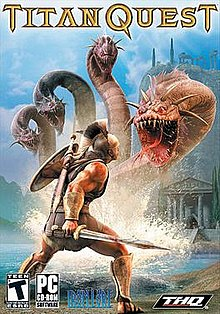Title of the work
Studio / Production Company
Country of the First Edition
Country/countries of popularity
Original Language
First Edition Date
Running time
Platform
Official Website
titanquestgame.com (accessed: August 20, 2018)
Available Onllne
Trailer: youtube.com (accessed: August 20, 2018)
Awards
Despite its age, Titan Quest is still being played and being re-released by its various publishers who have had the rights to it throughout the years, with the latest re-release being in 2016 as a 10th anniversary special edition and its release for iOS.
Genre
Hack-and-slash*
RPG (Role Playing Game)*
Target Audience
Crossover (Young adults + adults)
Cover

Titan Quest Game Cover Art, under creative commons licence (accessed: August 20, 2018).
Author of the Entry:
Nanci Santos, University of Roehampton, nancisantos@hotmail.co.uk
Peer-reviewer of the Entry:
Susan Deacy, University of Roehampton, s.deacy@roehampton.ac.uk
Elżbieta Olechowska, University of Warsaw, elzbieta.olechowska@gmail.com

Jeff Goodsill, under creative commons license (accessed: July 2, 2018).
Jeff Goodsill (Author, Producer)
Jeff Goodsill first became involved with video games in 1998 when he joined Ensemble Studios. Whilst at these studios, he became involved with Age of Empires II (1999) and Age of Empires II: The Conquerors (2000). He left in 2000 to join Sierra’s Papyrus Racing games where he became involved with NASCAR Racing 4 (2001) and NASCAR Racing 2002 Season (2002). Goodsill joined Iron Lore Entertainment in 2003 and was promoted to president of the company in 2007. Whilst at Iron Lore, he was the producer of Titan Quest (2006) and the Executive producer of Warhammer 40,000: Dawn of War – Soulstorm (2008).
Bio prepared by Nanci Santos, University of Roehampton, nancisantos@hotmail.co.uk

Brian Sullivan (Producer)
Brian Sullivan graduated from Carnegie Mellon University after studying Chemical Engineering. He also studied at Northeastern University where he took up Computer Engineering. Sullivan completed a master’s degree at Boston University in Business Administration, and another at Harvard University where he studied History. Sullivan was a founding partner of Ensemble Studios in 1996, co-creating the Age of Empires series, for which he won a Spotlight Award for Achievement in Game Design at the Computer Game Developers Association in 1998. Then, in 2003, he co-founded Iron Lore Entertainment along with Paul Chieffo. In addition to this, Sullivan has also worked as a professor at Northeastern University, teaching Game Design, though he has since left this job to work for Monsarrat Inc. where he is the Chief Creative Officer.
Bio prepared by Nanci Santos, University of Roehampton, nancisantos@hotmail.co.uk

Randall Wallace, under creative commons licence (accessed: May 30, 2018).
Randall Wallace
, b. 1949
(Screenwriter, Scriptwriter)
Randall Wallace was born in Tennessee on 28th July 1949. He attended Duke University, where he studied Russian, Religion and Literature. He began writing short stories, novel and scripts for TV series and films, his debut being the episode Fagin from the TV Series Hunter in 1986. His most notable screenplays for films include Braveheart (1995), The Man in the Iron Mask (1998), Pearl Harbour (2001), We Were Soldiers (2002), and the video game Titan Quest (2006). He has since also written the screenplay for the film Heaven Is for Real (2014) and the TV movie Point of Honor (2015).
Bio prepared by Nanci Santos, University of Roehampton, nancisantos@hotmail.co.uk
Translation
Editions in Other Languages:
store.steampowered.com/app/475150/Titan_Quest_Anniversary_Edition/ – English, French, Italian, German, Spanish, Czech, Polish, Russian, Japanese, Korean, Simplified Chinese.
Sequels, Prequels and Spin-offs
Sequels:
- Titan Quest: Immortal Throne (2006 Video game expansion pack);
- Titan Quest Anniversary Edition (2015 Video game anniversary edition with expansion);
- Titan Quest Mobile (Mobile release of the game to celebrate 10th anniversary).
Summary
Titan Quest tells the story of a warrior who travels through Greece, Egypt, and the Orient to re-establish the connection between the Olympian gods and the human race before the Titans destroy humanity. To do this, the hero must fight numerous mythical beasts, help various villages and civilisations, and ultimately destroy the Telchines, who are trying to summon the Titans to take over the Olympian gods.
The game’s art style consists of typical Greek scenarios. In the area between towns, there are typical Mediterranean areas with olive groves, forests and farmlands, whereas in the towns themselves, there are typical small houses and Greek temples, including an amphitheatre in some. (fig. with amphitheatre) Scattered across the game are also a number of ‘Mycenaean ruins’ and the famous Minoan Maze.
There are also a wide range of characters which the protagonist meets, such as Spartan soldiers, story tellers (who tell tales from the works of Homer and Hesiod), villagers, and merchants. The weapons available to the protagonist range from swords, spears, and bows to mage’s staffs and other magically modified weaponry. There is also a second type of attacks available named ‘masteries’. These resemble powers such as hunting, nature, warfare, dreams and spirit, amongst others. These abilities allow the player to summon helpers like for example with the power of nature. It allows the player to summon giant wolves and nymphs or gain the ability to heal the character, or other characters. An issue however, with both the story tellers and the weaponry, is that despite the fact the game seemingly being set in the Late Bronze Age/Early Iron Age period, given the setting and gameplay (including the materials the weapons are made of), the story teller displaces the story, making the game anachronistic. Early in the game, when the protagonist reaches Sparta, they speak to Leonidas, the great Spartan General (possibly the same general who fought in the Persian Wars, placing the game in the Classical period).
Finally, the music that accompanies the game was made so that it closely resembles music of that period, with an interesting end-credit song. Titled ‘When Gods Fall’, the song is in Ancient Greek and was composed after researching various historical songs. The song talks about when the gods lost their connection to the humans. (accessed: August 20, 2018).
The protagonist begins his/her (depending whether the player decides to choose a male or female character) journey having landed in the village of Helos, whose citizens are being troubled by satyrs destroying their farmland and crops. The protagonist agrees to help this village and finds out that this is not the only case of villagers being in despair as these beasts are roaming Greece causing chaos and destruction. This prompts the protagonist into trying to find the source of these beasts, travelling to Sparta, Megara, Delphi, Parnassus, Athens and Knossos. Upon reaching Knossos, the protagonist finds out that the Telchines are not just in Greece, but also in Egypt and in the Orient. Therefore, the player must go to Egypt, visit the Great Pyramids, the Hanging Gardens of Babylon and the Silk Road to China, to defeat the remaining two Telchines who are trying to free the Titan Typhon so he could overthrow Zeus. However, the player is too late and despite the defeat of the Telchines, the titan is released. The player must therefore chase after the titan and defeat him before he reaches Mount Olympus and takes over.
The diversity of themes that this game integrates in the story is very interesting. Firstly, there is the theme of Heroic humans, those not afraid to challenge mythical beasts put on Earth by deities. There is also the theme of the imprisonment of Titans and of the role of the Olympic gods as overseers of how the world works, as the famous episode of ‘Titanomachy’ refers to. This also incorporates the next theme which is the importance behind the connection between humans and the divine. At first, when it is severed, chaos is brought to earth, however, after seeing how humans can cope without divine intervention, Zeus decides to leave the connection as it is.
Analysis
Titan Quest provides the player with an immersive experience. It gives a realistic idea of what it would be like to travel throughout Greece and its diverse landscapes. The villages and cave designs are visually pleasing, the music was extensively researched and provides the player with an idea of what the music would be like at that time in the various regions, and the gaming experience is incredibly fun.
Titan Quest is perhaps one of the best examples of games centred around ancient mythology. It captures the Greek view of the world through the eyes of the protagonist whom the player can develop in whichever way they prefer, thanks to the RPG format. This results in at least 45 different combinations of attributes which the player can choose from, providing a varied game experience. The game itself, despite being anachronistic at times, still gives a real idea of what it would be like to travel from Laconia through to Delos and Athens in that time-period. The music further influences this by using typical instruments to each area of the game. Further to this, despite the fact the game is not explicitly referencing any ancient works, there are still little extras that can be found such as the storytellers who tell tales of old heroes and fierce mythical creatures that have roamed the Earth.
Further Reading
Anonymous (based on user’s average playing time), “Titan Quest”, How Long to Beat, 2017 (accessed: August 20, 2018).
Morton, Scott, “Titan Quest Designer Diary #3 – Music and Sound of an Ancient World”, Gamespot, January, 2006 (accessed: August 20, 2018).
Morton, Scott, “Developer Blogs: Aural Reactions”, IGN, March, 2006 (accessed: August 20, 2018).
Addenda
Titan Quest is a game created by Iron Lore (2000 – 2008), developers of Ages of Empires, and published by “Toy Headquarters” better known as THQ. It was produced by Jeff Goodsill and designed by Brian Sullivan. It was written by Randall Wallace and featured music from Scott Morton and Michael Verrette.
Titan Quest is a PEGI 12 game aimed at teenagers, young adults and adults who like the role-playing games genre (RPG). Being an RPG, the audience it aimed for were people who enjoy a longer game, in the isometric style similar to that of the Diablo series. ‘How Long to Beat It’ expects that the game will take on average 25 to 60 hours to complete (with an added 14 – 37 hours for its additional content – Titan Quest Immortal Throne), based on the time of those who have played the game and recorded their time.
Running Time: 25.5 – 60.5 hours (according to howlongtobeat.com, accessed: February 4, 2019) .
Genre: Action Roleplaying, Hack and Slash computer game


